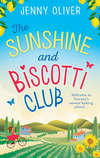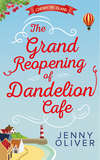Buch lesen: «The House We Called Home: The magical, laugh out loud summer holiday read from the bestselling Jenny Oliver»
JENNY OLIVER wrote her first book on holiday when she was ten years old. Illustrated with cut-out supermodels from her sister’s Vogue, it was an epic, sweeping love story not so loosely based on Dynasty. Since then Jenny has gone on to get an English degree and a job in publishing that’s taught her what it takes to write a novel (without the help of the supermodels).
Also by Jenny Oliver
The Parisian Christmas Bake Off
The Vintage Summer Wedding
The Little Christmas Kitchen
The Sunshine and Biscotti Club
The Summerhouse by the Sea

Copyright

An imprint of HarperCollins Publishers Ltd
1 London Bridge Street
London SE1 9GF
First published in Great Britain by HQ in 2018
Copyright © Jenny Oliver 2018
Jenny Oliver asserts the moral right to be identified as the author of this work.
A catalogue record for this book is available from the British Library.
This novel is entirely a work of fiction. The names, characters and incidents portrayed in it are the work of the author’s imagination. Any resemblance to actual persons, living or dead, events or localities is entirely coincidental.
All rights reserved under International and Pan-American Copyright Conventions. By payment of the required fees, you have been granted the non-exclusive, non-transferable right to access and read the text of this e-book on-screen. No part of this text may be reproduced, transmitted, downloaded, decompiled, reverse engineered, or stored in or introduced into any information storage and retrieval system, in any form or by any means, whether electronic or mechanical, now known or hereinafter invented, without the express written permission of HarperCollins.
Ebook Edition © June 2018 ISBN: 9780008217990
Version: 2018-06-14
Praise for Jenny Oliver
‘Brilliantly written, this is packed full of humour… A perfect holiday read.’
The Sun
‘This book made me want to dance on the beach with a glass of sangria in my hand. The perfect summer read.’
Sarah Morgan
‘This is a real treat. A touching story of love, loss and finding out what really matters in life. I love it!’
Julia Williams
‘Jenny Oliver writes contemporary women’s fiction which leaves you with a warm, fuzzy feeling inside.’
Books with Bunny
‘Intelligent, delightful and charming! The writing is exquisite.’
What’s Better Than Books
‘A perfect summer read.’
This Price Is Usually Right
‘A sprinkling of festivity, a touch of romance and a glorious amount of mouth-watering baking!’
Rea Book Review
‘…it was everything I enjoy…I couldn’t find a single flaw.’
Afternoon Bookery
‘I didn’t want to put the book down until I had reached the very last word on the last page.’
A Spoonful of Happy Endings
To Emily
Contents
Cover
About the Author
Also by Jenny Oliver
Title Page
Copyright
Praise
Dedication
CHAPTER 1
CHAPTER 2
CHAPTER 3
CHAPTER 4
CHAPTER 5
CHAPTER 6
CHAPTER 7
CHAPTER 8
CHAPTER 9
CHAPTER 10
CHAPTER 11
CHAPTER 12
CHAPTER 13
CHAPTER 14
CHAPTER 15
CHAPTER 16
CHAPTER 17
CHAPTER 18
CHAPTER 19
CHAPTER 20
CHAPTER 21
CHAPTER 22
CHAPTER 23
CHAPTER 24
CHAPTER 25
CHAPTER 26
CHAPTER 27
CHAPTER 28
CHAPTER 29
CHAPTER 30
CHAPTER 31
CHAPTER 32
CHAPTER 33
CHAPTER 34
CHAPTER 35
CHAPTER 36
CHAPTER 37
CHAPTER 38
CHAPTER 39
CHAPTER 40
CHAPTER 41
CHAPTER 42
CHAPTER 43
CHAPTER 44
CHAPTER 45
CHAPTER 46
CHAPTER 47
Extract
About the Publisher
CHAPTER 1
She stood at the cliff edge looking out at the rolling summer surf. The house towering behind her, solid grey stone and slate, bursting pink rhododendrons, white garden furniture that needed a paint. The image, like closing your eyes after glancing at the sun, almost indelible on her retina, beams of light dancing in the dark.
Out ahead, mountains of cloud hovered on the horizon, a windsurfer made painful progress in the non-existent breeze while paddleboarders cruised on water that glistened like a million jumping fish.
Moira balled up her fists. Tight so she could feel her nails in her palms. If she could she would have rattled them like a child throwing a tantrum. If she could she would have screwed her eyes shut and stamped her foot and shouted down at the bloody picture-perfect view, ‘Graham Whitethorn, you goddamn pain in the arse.’
But she couldn’t. Because from inside the hoody of the teenage boy standing beside her she could just glimpse big worried eyes, and see the wipe of snot on his frayed baggy cuffs.
So, instead she took a deep invigorating breath of salty sea air, pushed her hair from her face, and said, ‘Come on then, Sonny. Let’s make some breakfast and call your mother. Tell her what silly old Grandpa’s done.’
They turned back towards the house. The beautiful house. The image on her retina fitting the outline exactly.
CHAPTER 2
‘What do you mean he’s gone missing?’ Stella frowned into her phone, then almost without thinking pointed out of the car window and said to her seven-year-old, ‘Look, Rosie – Stonehenge.’
‘Missing…?’ Jack, her husband, mouthed from the driver’s seat.
Stella made a face, unsure.
Behind her, little Rosie had no interest in Stonehenge, deeply imbedded in YouTube on the iPad, happily powering through their 4G data with her gem-studded headphones on. Usually Stella would have clicked her fingers to get Rosie’s attention and pointed out of the window again to make sure she didn’t miss the view, but the phone call from her mother trumped any tourist attraction. ‘I don’t understand, Mum,’ Stella said. ‘How can Dad be missing? Where is he?’
Jack was frowning. Traffic was backing up from the roundabout up ahead.
‘Well darling, that’s what we don’t know,’ said her mother, her voice tinny over the phone.
Stella felt strangely out of control. Thoughts popped into her head that she wouldn’t have expected.
She and her father did not get along well. They barely talked. Hadn’t for years. Past anger had morphed into silence, and silence into habit – the threads tethered firmly in place, calcifying solid with stubbornness and age. Yet as her mother spoke, Stella found herself overcome by unfamiliar emotion. She worried suddenly that she might start to cry. God that would be embarrassing. Jack would probably crash the car in shock.
‘How long has he been missing?’ Stella asked, turning towards the window, eyes wide to dry the possible threat of tears.
‘Since yesterday,’ said her mother. ‘Although I’m not altogether sure what time he left because we were at Sainsbury’s.’
‘Since yesterday?’ Stella said, shocked. ‘Why didn’t you call before?’
‘Well, I knew you had a long drive today and I wanted you to get a good night’s sleep. And I thought it might be a good idea to give him a chance to come back without worrying everyone.’
This seemed very odd behaviour from her mother, who had never been the kind of person to suffer in silence.
‘So you’ve been worrying on your own?’
There was a brief silence at the other end of the phone.
‘Mum, are you OK?’
‘Yes darling, I’m fine,’ her mother said. And she sounded fine. Too fine. Almost drunk. Stella would have anticipated much more drama. A little more sobbing and neediness when actually she wondered if that was the kettle she could hear being flicked on in the background.
Stella frowned. ‘Is it something to do with Sonny? Is that why he’s left? Has Sonny been a pain?’
‘Not at all. Your father and Sonny have got on very well actually. I only told Sonny he’d gone this morning too – teenagers need their sleep, don’t they?’
Stella scrunched her eyes tight. The idea of her son and her father getting on well was too much at this point.
‘And have you rung Dad?’ Stella asked.
‘Yes. Straight to answerphone. He’s left a little note telling us not to worry.’
Stella pressed her hand to her forehead. She was really tired. They had left at five to avoid the weekend holiday traffic down to the Cornish coast but had stopped once already for Rosie to be sick in a Starbucks cup after secretly shovelling all the sweets meant for the five-hour journey into her mouth in the first twenty minutes. ‘Look, Daddy – a whole Haribo bear,’ she’d said, quite gleeful. The traffic report on the radio suggested that this current tailback was because a caravan had jack-knifed further up the A303. ‘What does the note say?’
‘Just that he’s gone away for a bit.’
‘But where?’
‘To be honest darling, I haven’t the foggiest.’
Something really wasn’t right in her mother’s reaction.
‘Mum, is there something you’re not telling me?’ Stella said, glancing across at Jack who was doing all sorts of faces back at her trying to get the gist of what was going on.
‘No darling, nothing.’
Stella nodded, wary. Disliking the feeling of uncertainty that had settled over her. ‘OK, well we’ll be at yours in about three hours I reckon.’
‘Don’t drive too fast,’ said her mother.
‘Unlikely with this traffic,’ Stella said, then added a goodbye.
When she hung up the phone Jack said, ‘Where’s your dad gone?’
Stella shook her head, chucking her phone into her bag. ‘She doesn’t know.’
Jack half-laughed. ‘That’s absurd. He doesn’t go anywhere.’
Stella held her hands wide. ‘Apparently he does.’
Jack looked like he was about to say something else but was cut off by the car behind beeping when Jack didn’t immediately move forward to fill the gap as the traffic rolled forward a car’s length.
‘I knew we should have taken the M4 route,’ he muttered.
Stella shook her head, incredulous. It had been her suggestion that they take the A303 and she couldn’t believe he hadn’t held in that comment in light of the whole missing-dad fiasco.
They drove on in silence for a while, the car warming up as their dodgy air conditioning failed to compete with the rising sun.
She and Jack had already had a row after she’d admitted being a bit nervous about seeing Sonny.
The reason they were currently driving down to Cornwall was to pick up their thirteen-year-old son, who, at the end of her tether, Stella had sent to stay with her parents for a fortnight.
Jack had sighed and replied, quite haughtily in Stella’s opinion, ‘Well, it should never have got this far in the first place! We should have dealt with it at home.’
‘You can keep saying that, Jack, but you weren’t there. You’re never there to see what a pain he is. You waltz in the door at seven thirty when it’s practically bedtime anyway.’
‘I do not waltz in the door.’
Stella had wanted to say that he very much did waltz in the door, but they’d been over this a thousand times already. That was how her and Jack’s relationship had been for the last few weeks. She’d tried countless times to explain to him the unrelenting frustration of every night trying to force their thirteen-year-old to get off his phone and do his homework, Stella’s own deadlines pressing down on her, stress mounting. Until the evening that Sonny had sworn he was doing his physics project but was just hiding his phone behind half a papier-mâché Vesuvius. Furious, Stella had whipped the phone off him, deleted the game he was playing and every other one and changed the password to her iTunes account so he couldn’t download anything else.
‘You stupid bitch!’ Sonny had shouted at her and then he’d looked immediately at the floor, his face rigid.
‘I beg your pardon?’
Silence.
‘Apologise. Now!’ Stella said, hands on her hips, eyes wide.
Still silence.
Time hung paused in the air.
‘Apologise.’ Nothing.
She could feel her heart rate rising. ‘If you don’t apologise, Sonny, by the time I count to three—’ The words came out of her mouth almost on instinct. As if she was so tired and stressed her brain had resorted to a time when she was guaranteed control. To when Sonny was a little kid and more than happy to apologise if it meant he’d get to keep his chocolate buttons.
Right now, Stella had no idea what she would do when she got to three. She should have used the deleting of the apps as bait but such strategy was easy in hindsight, all she could do now was start counting. ‘One.’
Sonny’s eyes stayed fixed on the ground.
Please just say sorry.
‘Two.’
His jaw clenched.
Stella took a breath in through her nose. She contemplated ‘two and a half’ but knew she was putting it off for her own benefit.
‘Three,’ she said.
Sonny looked up, stared her straight in the eye. Then the corner of his lip turned up in the smallest hint of a smirk, his expression saying, ‘What you gonna do now, Mum?’
For the first time ever, Stella had felt the urge to slap him round the face. She hadn’t. But it had crossed her mind that in that moment she didn’t like her son one bit. Nor did she know what to do with him. So she had walked away, hands raised in the air, and said, ‘Do you know what, I don’t need this.’ A flash of her own childhood had popped into her head. She imagined what would have happened if she’d looked at her father the way Sonny had just looked at her. It was unthinkable. The thought made her pause and turn, look at Sonny still grinning smugly down at the carpet, and say, ‘You can go to Cornwall. See what a few weeks with Granny and Grandpa does.’ Her father had certainly never taken any crap from her growing up.
So here they were, driving down to Cornwall a fortnight later to pick up Sonny. The morning sun was shimmering like dust in the air, tension thrumming through the car.
Stella glanced across at Jack’s profile. His eyes were fixed on the crawling traffic ahead. She hated that he’d cut her down when she’d mentioned feeling nervous about seeing their son because Jack was who she talked to. He was the person who made her feel better, who helped her think straight. Her wingman.
They didn’t usually fight over things like this, Jack usually took her lead on parenting. But they seemed so busy at the moment, both of them distracted with work, the kids being particularly kid-like, and with the start of the summer holidays they hadn’t had a proper chance to talk it all through. She had thought maybe they might on this five-hour journey, but now it all seemed rather overshadowed by the sudden and strange disappearance of her father.
Stella stared out of the window, repeating the fact over in her head, ‘Dad’s missing.’ But it wouldn’t really lodge properly in her brain, like a moth on a light bulb fruitlessly knock, knock, knocking to get inside. She didn’t want to acknowledge it – there were too many questions to know where to begin.
The traffic started moving again.
Stella felt completely off-kilter. She got her phone out to try and distract herself but immediately remembered the emails on there about a looming work deadline that she couldn’t bring herself to open. Work felt like another life. If she thought too much about it she could sense her normal balance of organised chaos teetering precariously into overwhelming. She stared at her phone. The screensaver was a picture of Rosie and Sonny posing over giant milkshakes piled high with whipped cream and a load of Cadbury’s flakes and Oreos shoved in the top – an after-school treat on Rosie’s birthday. It had all gone a bit pear-shaped after the photo was snapped because Sonny had accidentally on purpose nudged Rosie’s face into the cream, but it was rare to get a picture of the two of them smiling for the camera. Stella clicked the phone off and put it back in her bag. It scared her that she didn’t know if she wanted to see her own son. She had a vision of him at her parents’ house, would he even come down to greet them? Then she thought of the empty sofa cushion where her dad always sat and felt herself go a bit dizzy. Like her brain couldn’t hold all this stress. She pressed her palms to her temples.
‘You OK?’ Jack asked, glancing Stella’s way.
‘I’m not sure.’ Stella took some deep, calming breaths.
Jack frowned. Stella was always sure.
‘Are you going to be sick?’ he asked, panic in his voice. ‘Do you need a cup?’
She had to laugh. ‘No, I don’t need a cup.’
Then from the back seat Rosie shouted, ‘I need to go to the toilet.’
And Stella was back in the moment. Her momentary lapse shaken off by the sharp immediacy of parenting. ‘OK there’s a service station just up here,’ she said, glancing round to reassure Rosie and then back to Jack. ‘I’m fine,’ she added, to dispel his look of nervous concern. ‘Absolutely fine. Dad can’t have gone far. As you say, he doesn’t go anywhere so it won’t be that hard to find him.’ She got ready to undo her seat belt as Jack pulled into the Little Chef.
‘We find him. We get Sonny. We go. It’ll be fine.’
CHAPTER 3
Moira was nervous about her daughter arriving. She always got a little nervous around Stella, wrong-footed, feeling ever more the neurotic mother as she tried to make too many plans for their stay. Did the kids want to go to the new model railway, for example, because tickets were hard to get hold of and the queue without them snaked round the block. Stella’s replies of, ‘Don’t worry, it’ll be fine. We’ll decide when we get there,’ would leave Moira wound up like a spring – should she get tickets or not? When they arrived, Stella’s family would breeze into the house in a cloud of barely controlled pandemonium, eat everything in the fridge, traipse sand on the carpet, and uncork more wine than Moira and Graham drank in a month. Quite often Moira would escape to the kitchen to tidy up because the energy of them all was just too much. How many times she’d cleared up the plates at Christmas to the sound of one of Stella’s stories, loud and confident, secretly wishing she had a fraction of her daughter’s strength.
Now, as Moira stood in the kitchen making herself a cup of tea and glancing up at the driveway every time she heard a noise, convinced it was them, she thought how the memory of the few holidays Stella had with them existed in a short, loud blur. Like a rollercoaster – pause for too long and it would all fall from the sky.
She unhooked one of her Emma Bridgewater mugs from the Welsh dresser. It was a collection she’d amassed over the years – everyone buying her one of the decorative pieces for birthdays and Christmas after she’d once expressed a passing interest while flicking through a Country Living. Now she was almost overrun with the stuff, it was hard to know how to tell them to stop. When she’d had the kitchen done, Moira had considered packing it all away but couldn’t face the questions, imagining their faces, almost accusing about why she didn’t like it any more – if indeed she ever had. She wasn’t sure, it had just become who she was to them: ‘Mum, that’s the china you like.’ There would be too much hurt confusion to deal with if she changed.
The kettle clicked off. She poured the water three-quarters full, squished the teabag just so and added a long splosh of milk – far too much for Stella’s taste, which Moira would have to remember.
The day was warming up. She leant over and opened the kitchen window, filling the room with the heady, teasing scent of the jasmine that climbed up a trellis from a big pot by the front door. She stood, inhaling the perfume, her hip resting against her beautiful new rose marble kitchen worksurface – a recent, very expensive addition that Graham had huffed was change for change’s sake, but Moira adored. The smell of the jasmine was intoxicating. It made her want to pack up all that china immediately and go and buy the snazzy hand-thrown cups she’d seen in the local gallery with gold handles and bright turquoise stripes.
Graham would hate them.
Stella would mock them.
Or maybe she wouldn’t. Moira paused. Maybe Stella would like a gold-handled mug. Moira sipped her tea and thought briefly about whether she actually knew Stella at all nowadays. The telephone conversation asking them to have Sonny to stay for a fortnight had been the first time Stella had asked for anything in years. Moira had felt a momentary flutter of flattery but knew better than to ask Stella what had happened. ‘Of course, darling. I can meet you in Exeter if you like, save you the full trip. I’ve just repapered the spare bedroom – a lovely Zoffany gold, did you know they did wallpaper in TK Maxx now? – so he can sleep up there. Have his own little space.’ Waffling on in a nervous attempt not to pry.
But my God, she had wanted to know what was going on. The desire had tickled her insides like beetles. This type of thing didn’t happen to cool, confident Stella. Or ‘Potty-Mouth’ as anyone who read the Sunday News knew her as, one of the genre originators of the slummy-mummy brigade. The worst example, according to the Daily Mail, of resentful, neglectful motherhood with her gin-soaked, laissez-faire attitude to childrearing.
While Moira had tutted over a few of the expletives in Stella’s columns she’d always been quietly proud of her daughter’s success. Stella had worked her way up with no help from anyone. It had been an old friend of Moira’s who’d posted the copy of the local magazine where Stella’s first ever article had appeared along with a tiny headshot, ‘Is this your Stella?’ she’d scrawled on a Post-It, and Moira had had to lie when she’d telephoned her friend back, saying she knew all about it. Then soon followed by-lines in the national papers – Stella texting to say when and where at the request of her mother – and then full-page editorials in the colour supplements. Then came ‘Potty-Mouth’, as divisive as it was loved. But however controversial some elements, Moira would often allow herself the odd snigger when a straight-talking anecdote about the frustrations of motherhood touched a nerve.
But right now she couldn’t help wondering if all was quite as it once was. She’d noticed a slightly more acerbic tone to a few of the columns recently. Nothing too bad, just a touch less light-hearted. Poor little moody Sonny, who was currently upstairs locked in some battle on his laptop computer, hadn’t fared so well in a couple of them. She’d almost rung Stella to say something but hadn’t quite had the nerve.
She thought again of monosyllabic Sonny, sulkily slamming the door of Stella’s car at Exeter Services, trudging over in the torrential rain, hood down so his hair got soaked in a seeming deliberate defiance of his mother, and barely scowling a goodbye.
Moira went over to the bottom of the stairs and called, ‘Do you want a cup of tea, Sonny?’
‘No,’ he shouted back. Then a second later, ‘Thanks.’ As if remembering that he wasn’t in his own home and couldn’t quite get away with his desired level of moodiness.
Moira was still getting used to the open-plan nature of the entire bottom floor of the house. When she and Graham had first bought the place, full of youthful exuberance, it had been part of their grand renovation plans but they’d never got round to it. Then after Christmas Moira had insisted. Determined to get Graham up and doing something, she’d thought it was the perfect project. But never had she heard someone grumble and gripe quite so much and, in the end, she’d put Graham out of his misery and taken over the project herself mid-way. After it was done Graham had complained of a draught from the front door. At the time Moira couldn’t have given two hoots about a draught, high on the fact she’d overseen the renovation almost single-handed – with a lot of help from Dave the builder. But nowadays, while she still adored the light and space, she missed the fact she could no longer shut herself away in the kitchen, imagining herself alone. And, if pushed, she might concede to a slight draught, on a chilly day.
Walking back across the beautifully sanded wooden floorboards, she remembered the look of terror on Sonny’s face when on Day One of his Cornish banishment Graham had stood in the centre of the living room and barked, ‘No hoods up indoors, no stomping on the stairs, and we say “please” and “thank you” in this house.’ Graham had marched over to the bottom of the stairs, glowering across at Sonny who had, a second before, been head down, hood up, stomping up the stairs ignoring an offer from Moira of a toasted teacake, and said, ‘Got that, young man?’
Moira had been standing in the exact same place she was now and had been as shocked as Sonny to see Graham unfurl himself from the sofa and stride across to the hallway to issue his orders.
The new layout had proved an unexpected bonus from that moment. It gave Moira the perfect vantage point to view the gradual development of the Sonny and Graham show, something she would have missed had the great big wall still been in place separating the kitchen and the lounge. She would stand, chopping, mixing, sometimes just pretending to do either, and watch the pair of them in bemused fascination.
It had started after an almost silent evening meal – not uncommon in their household lately – when Graham was back firmly in front of the TV and Sonny slumped in the armchair opposite. Graham had muttered, ‘Bloody phones. Do you ever look up from that thing?’
Sonny had glanced up, eyes narrowed, looking the spitting image of Stella and said, ‘Do you ever look up from that?’ gesturing towards the TV.
Moira, who was drying up her Limited Edition Emma Bridgewater mugs to commemorate the birth of each of the Duke and Duchess of Cambridge’s children, had held her breath, waiting to see what might happen. Whether Graham still had it in him to rage at insolence. She’d seen it flit across his face, but Sonny didn’t flinch, just sat, eyes locked with his. The stance intentionally designed to provoke, as if Sonny had gone upstairs after that first telling off from Graham and drawn out his battle plans.
To Moira’s surprise, Graham had reached forward for the remote, turned the TV off and said, ‘Come on then, show me.’
And they sat for hours, Graham having gone to get his glasses then watching as Sonny scrolled through miles on his phone. Moira couldn’t believe there was enough in there to look at. At one point they’d watched something that had them both in stitches. Moira had squashed an urge to go and look at what it was that could make Graham laugh like that nowadays. But just as much she didn’t want to know, she’d wasted enough of her time trying to fathom his moods. Instead she had made herself a peppermint tea in her newly washed-up Prince George mug and considered how much cheaper it was getting Sonny to stay as a way of piquing Graham’s interest than knocking down the entire ground floor.
Now, just the thought of Graham made her furious. Made her wipe down the rose marble with frustrated vigour. Made her slam the window shut, annoyed with the bloody jasmine and its sickly overpowering smell. She thought of him sitting on that sofa barely moving except to come and sit silent and grumpy at the dinner table and chew infuriatingly loudly, scoff at the newspaper, or sigh at building costs and plumbers’ estimates. For the last two years they’d lived under a grey cloud – longer than that if she was honest – and then suddenly he ups sticks and disappears.
Furious was an understatement. In Moira’s opinion he’d gone missing in order to be missed. She paused in her wiping and stared out at the giant hydrangea that lined the gravel drive – pink when she’d have preferred blue, someone once advised she plant a rusty nail in the soil to make it change colour, fat lot of good that had done – and wondered if they could just not find him. If he was old enough to leave, he was old enough to find his way home.
Wouldn’t that teach him a lesson, she thought as she went over and started cleaning the hob, for taking something that for the first time in her life was hers, taking it and stealing it for himself.
It was too hot. Moira walked over to the dining room area and threw open the big French windows, welcoming the deafening sounds of the sea and the unfailingly calming view out over the cliff to the beach.
There was a glimmer of a breeze. Moira fanned herself with her hand considering how, before she had discovered Graham’s note the previous afternoon, she had spent most of the week – rehearsing as she lay in Stella’s old bedroom where she now slept – plucking up the courage to tell Stella when she arrived, ‘I’m leaving your father. I’m starting a new life.’
But Graham had beaten her to it. Stolen her thunder. Kept her firmly where she was, unable to leave while he was missing. Hence why the thought of ignoring his little sojourn teased her so, danced around in her head like an excited imp too wily to catch.




















